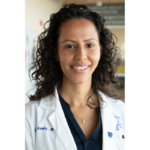
ECOG-ACRIN Welcomes Catherine Handy Marshall as its First Winn Clinical Investigator Leadership Awardee
March 7, 2024
Now Enrolling: EA5221/ACHIEVE for Older Adults With Advanced Non-Small Cell Lung Cancer
March 7, 2024Now Enrolling: EAQ222CD/CostCOM to Reduce Financial Hardship for Patients with Cancer

EAQ222CD – Effectiveness of Out-of-Pocket Cost COMmunication and Financial Navigation (CostCOM) in Cancer Patients
The study chair for this trial is Gelareh Sadigh, MD (University of California, Irvine). The community co-chair is Pamala A. Pawloski, PharmD (HealthPartners Institute).
Cancer is often associated with financial hardship for several reasons: high medical out-of-pocket costs, lost productivity, and changes in employment, income, and insurance. Many people with cancer experience financial hardship, leading them to delay, forgo, change, or even stop cancer care. In addition, financial hardship can yield material hardship—such as medical debt, loans, or home sale—and financial worry. Financial hardship is linked to poor quality of life (QOL), care dissatisfaction, and lower survival.
Several factors that can decrease financial hardship are price transparency, financial navigation, and counseling. The EAQ222CD/CostCOM study aims to develop and test a scalable intervention to reduce financial hardship utilizing these factors. The study team has partnered with TailorMed, a commercial vendor for the use of its price estimator and financial navigation platform, which includes remote financial counselors. They have developed Cost COMmunication and Financial Navigation (CostCOM), a three-pronged strategy consisting of:
- Estimated out-of-pocket costs for treatment
- Navigation to financial assistance programs and discussion of approaches to improve insurance coverage
- Counseling to address financial concerns
In pilot studies, investigators successfully delivered all three components of CostCOM during one-hour remote financial counseling sessions to 20 patients with cancer and 30 patients with multiple sclerosis across two health systems. These patients reported lower financial worry within 3 months of receiving CostCOM. The EAQ222CD study team hypothesizes that more frequent patient engagement with CostCOM during the first year after diagnosis may decrease cost-related changes in cancer care and material hardship while alleviating financial worry. They also anticipate that the remote financial counseling provided through CostCOM will be beneficial to oncology practices, which often lack or have limited access to on-site counselors.
This study is for clinical sites in the National Cancer Institute (NCI) Community Oncology Research Program (NCORP) that participate in cancer care delivery research (CCDR) trials. At least 15 NCORP practices will be selected.
The study plans to enroll approximately 720 patients. They will be randomized to receive either CostCOM or enhanced usual care (EUC). Patients in the CostCOM arm will participate in four 1-hour phone/video one-on-one sessions with a remote financial counselor at baseline, 3, 6, and 12 months. Patients in the EUC arm will receive the usual financial information offered at the cancer clinic, as well as a brochure from the Patient Advocate Foundation, a national non-profit organization that offers free financial counseling.
All study participants will complete surveys at baseline, 3, 6, and 12 months. Patients in the CostCOM arm will complete an additional 5-minute survey after each financial counseling session.
The trial’s primary objective is to compare patient-reported cost-related cancer care nonadherence at 12 months after completion of the baseline survey between the two study groups. Secondary objectives include comparing patient-reported material financial hardship, financial worry, QOL, and satisfaction with care between the two groups.
To be eligible for CostCOM, patients must be receiving care at a participating NCORP site. They must be age 18 or older and fluent in written and spoken English or Spanish. They must be within 120 days of a new diagnosis of any solid cancer of any stage. Patients must have initiated systemic therapy or plan to initiate systemic therapy within 30 days of consenting to the trial.
Learn more about EAQ222CD at ecog-acrin.org.
![ECOG-ACRIN logo[19516]275×75](https://blog-ecog-acrin.org/wp-content/uploads/2021/03/ECOG-ACRIN-logo19516275x75.png)
